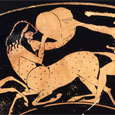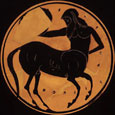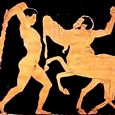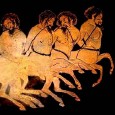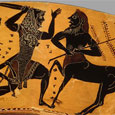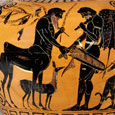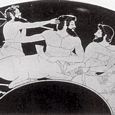KENTAUROI
Greek Name
Κενταυρος Κενταυροι
Transliteration
Kentauros, Kentauroi
Latin Spelling
Centaurus, Centauri
Translation
Bull-Slayer? (tauros)
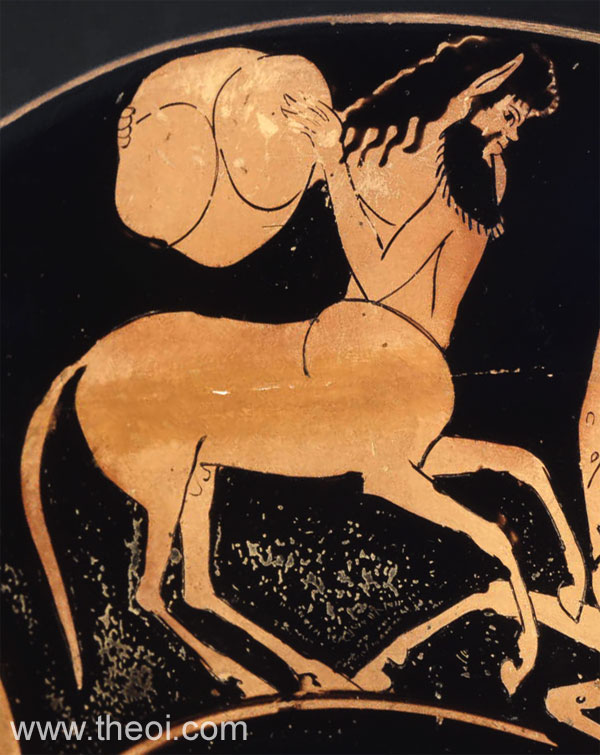
THE KENTAUROI PELOPONNESIOI (Peloponnesian Centaurs) were a tribe of half-man, half-horse Arkadian wildmen who fought Herakles for the wine of their hospitable brother Pholos (Pholus). Most of them were slain in the battle which ensued--felled by poisoned arrows. The few survivors fled south to the Malean peninsular or Eleusis where they were given refuge by Poseidon.
The Peloponnesian Kentauroi appear to be distinct from the Thessalian Kentauroi (Centaurs) of Magnesia in northern Greece, although classical writers often conflate their two stories.
FAMILY OF THE CENTAURS
PARENTS
[1.1] IXION & NEPHELE (as immigrant Thessalian Kentauroi)
[2.1] SEILENOS & MELIA (as brothers of
the Arkadian kentauros Pholos)
NAMES
[1.1] PHOLOS, EURYTION, NESSOS, ANKHIOS, AGRIOS,
ELATOS (Apollodorus 2.83)
[1.2] RHOIKOS, HYLAIOS (Apollodorus 3.106, Callimachus Hymn to Artemis)
[1.3] PHOLOS, DAPHNIS, ARGEIOS, AMPHION, HIPPOTION, OREIOS, ISOPLES,
MELANKHAITES, THEREUS, DOUPON, PHRIXOS, HOMADOS (Diodorus Siculus 4.12.3)
[1.4] ELAIOS, PETRAIOS, ASBOLOS (Athenian Vase Painting O12.2)
ENCYCLOPEDIA
CENTAURI (Kentauroi). The Erymanthian boar, which Heracles was ordered to bring alive, had descended from mount Erymanthus (according to others, from mount Lampe,) into Psophis. Heracles chased him through the deep snow, and having thus worn him out, he caught him in a net, and carried him to Mycenae. (Apollod. ii. 5. § 4; Diod. iv. 12.) It must be observed that this and subsequent labours of Heracles are connected with other subordinate ones, called Parerga, and the first of these parerga is the fight of Heracles with the Centaurs; for it is said that in his pursuit of the boar he came to the centaur Pholus, who had received from Dionysus a cask of excellent wine. Heracles opened it, contrary to the wish of his host, and the delicious fragrance attracted the other centaurs, who besieged the grotto of Pholus. Heracles drove them away: they fled to the house of Cheiron, and Heracles, eager in his pursuit, wounded Cheiron, his old friend. Heracles was deeply grieved, and tried to save Cheiron; but in vain, for the wound was fatal. As, however, Cheiron was immortal, and could not die, he prayed to Zeus to take away his immortality, and give it to Prometheus. Thus Cheiron was delivered of his burning pain, and died. Pholus, too, was wounded by one of the arrows, which by accident fell on his foot and killed him. This fight with the centaurs gave rise to the establishment of mysteries, by which Demeter intended to purify the hero from the blood he had shed against his own will. (Apollod. ii. 5. § 4; Diod. iv. 14; Eurip. Herc. Fur. 364, &c.; Theocrit. vii. 150; Apollon. Rhod. i. 127; Paus. viii. 24. §2; Ov. Met. ix. 192.)
HYLAEUS (Hulaios), that is, the woodman, the name of an Arcadian centaur, who was slain by Atalante, when, in conjunction with Rhoetus, he pursued her. (Apollod. iii. 9. § 2; Callim. Hymn. in Dian. 221; Aelian, V. H. xiii. 1.) According to Propertius (i. 1, 13) Hylaeus had also attacked and severely wounded Meilanion, the lover of Atalante. (Comp. Ov. Ars Am. ii. 191.) According to some legends, Hylaeus fell in the fight against the Lapithae, and others again said that he was one of the centaurs slain by Heracles. (Virg. Georg. ii. 457; Serv. ad Aen. viii. 294; comp. Horat. Carm. ii. 12, 5.)
RHOECUS (Rhoikos), a centaur who, conjointly with Hylaeus, pursued Atalanta in Arcadia, but was killed by her with an arrow (Apollod. iii. 9. § 2; Callim. Hymn. in Dian. 221; Aelian, V. H. xiii. 1). This centaur is perhaps the same as the one who is called Rhoetus by Latin poets.
Source: Dictionary of Greek and Roman Biography and Mythology.
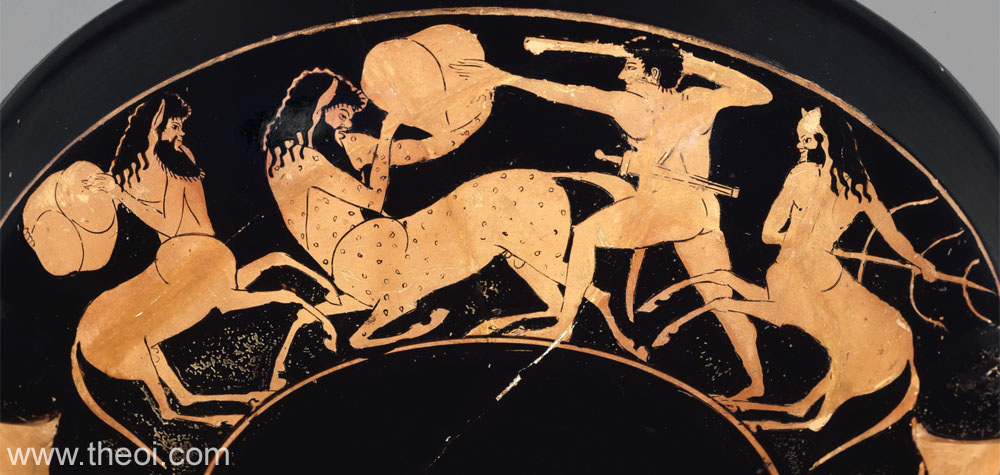
CLASSICAL LITERATURE QUOTES
HERACLES & THE CENTAURS
Pseudo-Apollodorus, Bibliotheca 2. 83 - 87 (trans. Aldrich) (Greek mythographer C2nd
A.D.) :
"As Herakles (Heracles) was travelling through [Mount] Pholoe, he stopped with a Kentauros (Centaur) named
Pholos (Pholus), the son of Seilenos (Silenus) and a Melian Nymphe. To Herakles he served roasted meat, although
his own was raw. Herakles asked for wine, but Pholos said that he was afraid to open the cask which was owned
jointly be the Kentauroi (Centaurs). But Herakles told him not to worry, and opened the cask himself. Shortly
thereafter, picking up the smell of the wine, the Kentauroi appeared at Pholos' cave, armed with rocks and clubs
of silver fir. The first two who ventured in, by name Ankhios (Anchius) and Agrios (Agrius), Herakles turned
back with a volley of fire-brands; he sent arrows after the others and chased them as far as [the peninsular of]
Malea. There they took refuge with Kheiron (Chiron), who, after the Lapithai (Lapiths) had driven him from Mount
Pelion, settled on Malea. Herakles let loose an arrow at the Kentauroi as they huddled round Kheiron, which
penetrated the arm of Elatos (Elatus) and landed in Kheiron's knee. In horror Herakles ran to him, pulled out
the arrow and dressed the wound with a salve that Kheiron handed him. The festering wound was incurable,
however, and Kheiron moved into his cave, where he yearned for death, but could not die because he was immortal.
Prometheus thereupon proposed Herakles to Zeus, to become immortal in place of Kheiron: and so Kheiron died.
The remaining Kentauroi fled this way and that, some to Mount Malea [the southernmost peninsular of the
Peloponnese], Eurytion to Pholoe, Nessos to the Euenus (Evenus) river. The rest were taken in at Eleusis by
Poseidon, who hid them away on a mountain. As for Pholos, as he was pulling an arrow out of a corpse, he
marvelled that such a little object could destroy such enormous adversaries. Just then it slipped from his hand,
fell on his foot and instantly killed him. When Herakles returned to Pholoe, he found Pholos dead, so he buried
him and proceeded on to find the boar."
Diodorus Siculus, Library of History 4. 69. 4 (trans. Oldfather) (Greek historian
C1st B.C.) :
"The Kentauroi (Centaurs) gathered all their forces, made a campaign against the Lapithes (Lapiths) [of
Thessalia (Thessaly)], and slew many of them, the survivors fleeing into Mt Pholoe in Arkadia (Arcadia)and
ultimately escaping from there to Cape Malea, where they made their home. And the Kentauroi, elated by these
successes, made Mount Pholoe the base of their operations, plundering the Greeks who passed by, and slew many of
their neighbours."
Diodorus Siculus, Library of History 4. 12. 3 :
"About the time that Herakles (Heracles) was performing these Labours [i.e. his quest for the Erymanthian
boar in Arkadia], there was a struggle between him and the Kentauroi (Centaurs), as they are called, the reason
being as follows. Pholos (Pholus) was a Kentauros (Centaur), from whom the neighbouring mountain came to be
called Pholoe, and received Herakles with the courtesies due to a guest and opened for him a jar of wine which
had been buried in the earth. This jar, the writers of myths relate, had of old been left with a certain
Kentauros by Dionysos, who had given him orders only to open it when Herakles should come to that place.
And so, four generations after that time, when Herakles was being entertained as a guest, Pholos recalled the
orders of Dionysos.
Now when the jar had been opened the sweet odour of the wine, because of its great age and strength, came to the
Kentauroi dwelling near there, it came to pass that they were driven mad; consequently they rushed in a body to
the dwelling of Pholos and set about plundering him of the wine in a terrifying manner. At this Pholos hid
himself in fear, but Herakles, to their surprise, grappled with those who were employing violence. He had indeed
to struggle with beings who were gods on their mother's side, who possessed the swiftness of horses, who had the
strength of two bodies, and enjoyed in addition the experience and wisdom of men.
The Kentauroi advanced upon him, some with pine trees which they had plucked up together with the roots, others
with great rocks, some of with burning firebrands, and still others with axes such as are used to slaughter
oxen. But he withstood them without sign of fear and maintained a battle which was worthy of his former
exploits. The Kentauroi were aided in their struggle by Nephele (Cloud), who sent down a heavy rain, by which
she gave no trouble to those which had four legs, but for him who was supported upon two made the footing
slippery. Despite all this Herakles maintained an astonishing struggle with those who enjoyed such advantages as
these, slew the larger part of them, and forced the survivors to flee.
Of the Kentauroi which were killed the most renown were Daphnis, Argeios (Argeus), Amphion, also Hippotion,
Oreios (Oreus), Isoples, Melankhaites (Melanchaetes), and Thereus, Doupon, and Phrixos (Phrixus).
As for those who escaped the peril be flight, every one of them later received a fitting punishment: Homados,
for instance was killed in Arkadia (Arcadia) when he was attempting to violate Alkyone (Alcyone), the sister of
Eurystheus. And for this feat it came to pass that Herakles was marvelled at exceedingly; for though he had
private grounds for hating his enemy [Eurystheus], yet because he pitied her who was being outraged, he
determined to be superior to others in humanity.
A peculiar thing also happened in the case of him who was called Pholos, the friend of Herakles. While he was
burying the fallen Kentauroi, since they were his kindred, and was extracting an arrow from one of them, he was
wounded by a barb, and since the wound could not be healed he came to his death. Herakles gave him a magnificent
funeral and buried him at the foot of the mountain, which serves better than a gravestone to preserve his glory;
for Pholoe makes known the identity of the buried man by bearing his name and no inscription is needed. Likewise
Herakles unwittingly by a shot from his bow killed the Kentauros Kheiron (Centaur Chiron), who was admired for
his knowledge of healing. But as for the Kentauroi let what we have said suffice."
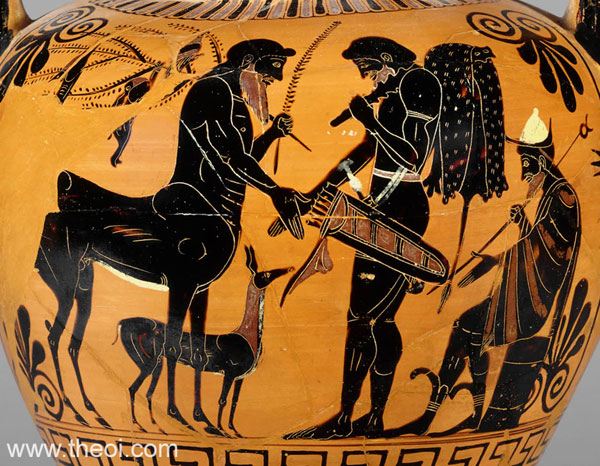
Diodorus Siculus, Library of History 4. 14. 3 :
"Demeter instituted the Lesser Mysteries [at Athens] in honour of Herakles, that she might purify him of
the guilt he had incurred in the slaughter of the Kentauroi (Centaurs)."
Strabo, Geography 8. 3. 19 (trans. Jones) (Greek geographer C1st B.C. to C1st A.D.)
:
"It [the River Anigros of Elis] emits an offensive odor for a distance of twenty stadia, and makes the fish
unfit to eat. In the mythical accounts, however, this is attributed by some writers to the fact that certain of
the Kentauroi (Centaurs) here washed off the poison they got from the Hydra."
Strabo, Geography 9. 4. 8 :
"Here [in Ozolian Lokris], also, is Khalkis (Chalcis) . . . Here, also, is the hill Taphiassos, on which
are the tombs of Nessos (Nessus) and the other Kentauroi (Centaurs), from whose putrefied bodies, they say,
flows forth at the base of the hill the water which is malodorous and clotted; and it is on this account, they
add, that the tribe is also called Ozolian [i.e. from the Greek word ozein meaning ‘to
smell’]."
Pausanias, Description of Greece 3. 18. 10 - 16 (trans. Jones) (Greek travelogue C2nd
A.D.) :
"[Amongst the scenes depicted on the throne of Apollon at Amyklai (Amyclae) near Sparta :] There are also
reliefs of . . . the battle of the Kentauroi (Centaurs) at the cave of Pholos (Pholus) . . . [and also] there is
represented the fight between Herakles and Oreios (Oreus) the Kentauros (Centaur)."
Pausanias, Description of Greece 5. 5. 9 - 10 :
"The Anigros [river of Elis] descends from the mountain Lapithos (Lapithus) in Arkadia (Arcadia), and right
from its source its water does not smell sweet but actually stinks horribly . . . Some Greeks say that Khiron
(Chiron), other that Pylenor another Kentauros (Centaur), when shot by Herakles fled wounded to this river and
washed his hurt in it, and that it was the Hydra's poison which gave the Anigros its nasty smell."
Pausanias, Description of Greece 5. 19. 9 :
"[Amongst the scenes depicted on the chest of Kypselos (Cypselus) dedicated at Olympia :] The man shooting
at Kentauroi (Centaurs), some of which he has killed, is plainly Herakles, and the exploit one of his."
Quintus Smyrnaeus, Fall of Troy 6. 274 ff (trans. Way) (Greek epic C4th A.D.)
:
"[Amongst the scenes depicted on the shield of Herakles' grandson Eurypylos :] There stormed the wild rout
of the Kentauroi (Centaurs) round the hall of Pholos (Pholus) : goaded on by Eris (Strife) and wine, with
Herakles the monsters fought. Amidst the pine-trunks stricken to death they lay still grasping those strange
weapons in dead hands, while some with stems long-shafted still fought on in fury, and refrained not from the
strife; and all their heads, gashed in the pitiless fight, were drenched with gore--the whole scene seemed to
live--with blood the wine was mingled: meats and bowls and tables in one ruin shattered lay."
Quintus Smyrnaeus, Fall of Troy 7. 108 ff :
"When of old on Pholoe's long-ridged heights upon the Kentauroi (Centaurs) terrible Herakles rushed
storming in might, and slew them, passing-swift and strong and battle-cunning though they were."
Philostratus the Younger, Imagines 16 (trans. Fairbanks) (Greek rhetorician C3rd
A.D.) :
"Nessos (Nessus), who alone escaped the hand of Herakles at Pholoë, when none but he escaped of those
[Kentauroi (Centaurs)] who wickedly attacked the hero."
Oppian, Cynegetica 2. 5 ff (trans. Mair) (Greek poet C3rd A.D.) :
"By the foot of windy Pholoe did savage tribes, half-beast half-men [Kentauroi (Centaurs)], human to the
waist but from the waist horses, invent the chase [of the hunt] for pastime after the banquet."
Ovid, Metamorphoses 9. 191 (trans. Melville) (Roman epic C1st B.C. to C1st A.D.)
:
"The Centauri (Centaurs) quailed before me [Heracles]."
Ovid, Metamorphoses 11. 548 ff :
"As Nestor told this tale of battles fought between Lapithae and the half-man Centauri (Centaurs),
Tlepolemus took offence that Alcides [Heracles] had been passed by in silence and exclaimed: ‘I am
surprised, my lord, that you've forgotten the feats of Hercules. Why, many a time my father used to tell me how
he quelled the cloud-born (nubigenae) [Centaurs].’"
Ovid, Heroides 9. 87 ff (trans. Showerman) (Roman poetry C1st B.C. to C1st A.D.)
:
"[Heracles] told of the deeds . . . The equestrian array [i.e. the Centaurs] that put ill trust in their
feet and dual form, confounded by you on the ridges of Thessalia."
Valerius Flaccus, Argonautica 3. 65 ff (trans. Mozley) (Roman epic C1st A.D.)
:
"[The centaur] Rhoetus, clouded with excess of wine and seeing Pholoe double and the stars larger than
their wont, rushed upon Alcides [Heracles] and Theseus."
ATALANTA & THE CENTAURS
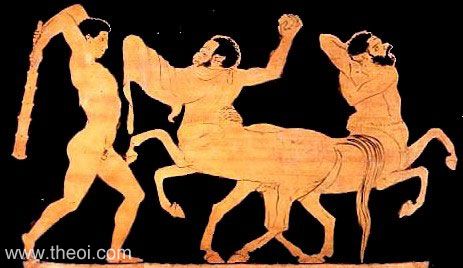
Pseudo-Apollodorus, Bibliotheca 3. 106 (trans. Aldrich) (Greek mythographer C2nd
A.D.) :
"When she was grown Atalante (Atalanta) guarded her virginity, and when she went hunting in the wilderness
she was always fulling armed. The Kentauroi (Centaurs) Rhoikos (Rhoecus) and Hylaios (Hylaeus) tired to rape
her, but she killed them with her bow and arrows."
Callimachus, Hymn 3 to Artemis 220 ff (trans. Mair) (Greek poet C3rd B.C.)
:
"Nor do I deem that [the Centaurs] Hylaios (Hylaeus) and foolish Rhoikos (Rhoecus), for all their hate, in
Haides slight her [Atalanta's] archery. For the loins, with whose blood the height of Mainalos (Maenalus) [in
Arkadia (Arcadia)] flowed, will not abet the falsehood."
Aelian, Historical Miscellany 13. 1 (trans. Wilson) (Greek rhetorician C2nd to 3rd
A.D.) :
"One day her [Atalanta's] neighbours, audacious lovers and very tiresome revellers, burst in upon her
noisily at midnight; they were two of the Kentauroi (Centaurs), Hylaios (Hylaeus) and Rhoikos (Rhoecus). Their
noisy interruption was not done with flute players or in the style of young men from the city; there were pine
torches, which they lit and made to burn fiercely; the first sight of fire would have terrified even the
population of a city, let alone a solitary young woman. Breaking fresh branches off the pines they wove them
together and made garlands for themselves. The incessant, continuous sound of hooves was heard in the mountains;
they burned trees and made towards the young woman, evil suitors who in a violent and over-excited state brought
gifts for the wedding in advance. But she saw through their plan. From the cave she caught sight of fire and
realised who the revellers were; not flinching or cowed by what she saw she bent her bow, shot her weapon, and
hit the first of them directly. He lay there, and the other advanced, no longer in the mood of a reveller but
with hostile intent, wishing to defend his companion and vent his anger. But he too was punished, by the young
woman's other arrow."
Propertius, Elegies 1. 1 (trans. Goold) (Roman elegy C1st B.C.) :
"By shrinking from no hardship Milanion broke down the cruelty of harsh Atlanta. For now he wandered
distraught in the glen of Parthenius, and now he would go confront shaggy wild beasts [Centaurs]. He was also
dealt a wound from the club Hylaeus bore, and on the rocks of Arcady he moaned in pain."
THE CENTAURS & THE SIRENS
Lycophron, Alexandra 648 ff (trans. Mair) (Greek poet C3rd B.C.) :
"Others [Odysseus] shall wander . . . the narrow meet of the Tyrrhenian Strait and the watching-place fatal
to the hybrid monsters [the Kentauroi (Centaurs)] . . . and the rocks of the harpy-limbed nightingales [the
Seirenes (Sirens)]."
Ptolemy Hephaestion, New History Book 6 (summary from Photius, Myriobiblon 190)
(trans. Pearse) (Greek mythographer C1st to C2nd A.D.) :
"In the Alexandra which Lykophron (Lycophron) wrote: ‘What sterile nightingale killer of
Kentauroi (Centaurs)’, these are the Seirenes (Sirens) who he called killers of Kentauroi
(Centaurs)."
Ptolemy Hephaestion, New History Book 5 (summary from Photius, Myriobiblon 190)
:
"The Kentauroi (Centaurs) who fled from Herakles through Tyrsenia [in Italy] perished of hunger, ensnared
by the soft song of the Seirenes (Sirens)."
SHADES OF CENTAURS - GUARDIANS OF THE UNDERWORLD
Virgil, Aeneid 6. 287 ff (trans. Fairclough) (Roman epic C1st B.C.) :
"Many monstrous forms besides of various beasts are stalled at the doors [of the Underworld], Centauri
(Centaurs) and double-shaped Scyllae, and the hundredfold Briareus, and the beast of Lerna [Hydra], hissing
horribly, and the Chimaera armed with flame, Gorgones and Harpyiae (Harpies), and the shape of the three-bodied
shade [Geryon]."
Seneca, Hercules Furens 773 ff (trans. Miller) (Roman tragedy C1st A.D.) :
"Alcmena's son [Heracles] o'erpowers the ferryman [of the underworld] [Kharon (Charon)] with his own pole
and climbs aboard . . . Then the [ghosts of the] monsters he had conquered are in a panic, the fierce Centaurs
and the Lapithae whom too much wine had inflamed to war; and, seeking the farthest fens of the Stygian swamp,
Lerna's labour [the Hydra] plunges deep his fertile heads."
[I.e. The ghosts of various monsters guarded the shores of the river Akheron before the entrance to Haides.]
Statius, Thebaid 4. 536 ff (trans. Mozley) (Roman epic C1st A.D.) :
"Why should I tell thee of Erebus' [Haides'] monsters, of Scyllas, and the empty rage of Centauri
(Centaurs), and the Gigantes' (Giants) twisted chains of solid adamant, and the diminished shade of hundredfold
Aegaeon?"
Statius, Silvae 5. 3. 260 ff (trans. Mozley) (Roman poetry C1st A.D.) :
"[A man prays that his father's soul has a peaceful journey to the underworld :] But do ye, O monarchs of
the dead and thou, Ennean Juno [Persephone], if ye approve my prayer . . let the warder of the gate [Kerberos
(Cerberus)] make no fierce barking, let distant vales conceal the Centauri (Centaurs) and Hydra's multitude and
Scylla's monstrous horde [and other monsters appointed guardians of Haides in death]."
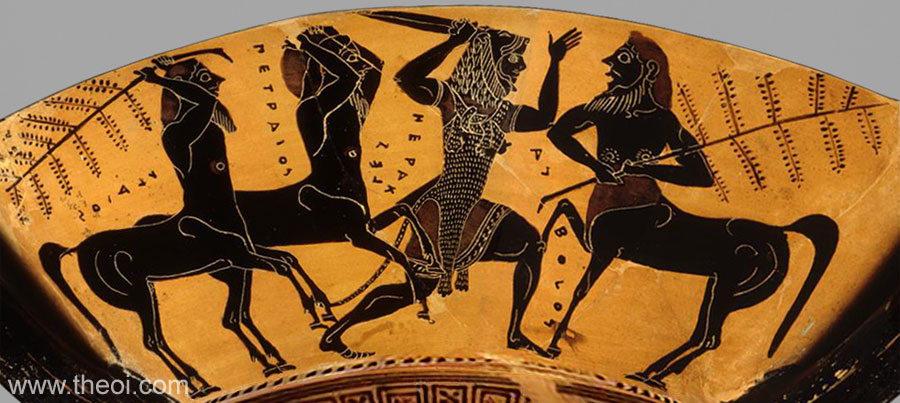
NAMES OF PELOPONNESIAN CENTAURS
Greek Name
Φωλος
Δαφνις
Αργειος
Αμφιων
Transliteration
Phôlos
Daphnis
Argeios
Amphiôn
Latin Spelling
Pholus
Daphnis
Argeus
Amphion
Translation
Of the Cave (phôleos)
Laurel Tree (daphnis)
Silver-(haired) (argos)
Bad-Wine? (amphias)
Greek Name
Ἱπποτιων
Ορειος
Ισοπλης
Μελανχαιτης
Transliteration
Hippotiôn
Oreios
Isoplês
Melankhaitês
Latin Spelling
Hippotion
Oreus
Isoples
Melanchaetes
Translation
Horseman (hippotês)
Of the Mountain (oreios)
Equal in Number (isoplês)
Black-Manced (melas, khaitê)
Greek Name
Θηρευς
Φριξος
Δουπων
Ὁμαδος
Transliteration
Thêreus
Phrixos
Doupôn
Homados
Latin Spelling
Thereus
Phrixus
Dupon
Homadus
Translation
Bestial (thêreios)
Bristling (phrixos)
Heavy-Thudding (doupos)
Tumult, Din (homados)
Greek Name
Νεσσος
Αγριος
Ελατος
Αγχιος
Ευρυτιων
Transliteration
Nessos
Agrios
Elatos
Ankhios
Eurytiôn
Latin Spelling
Nessus
Agrius
Elatus
Anchius
Eurytion
Translation
Duck? (nêssa)
Wild, Savage (agrios)
Beaten, Ductile (elatos)
Withdraw, Retire (ankhôreô)
Fine Drinking-Horn (eu-, rhytos)
Greek Name
Πυληνορ
Πετραιος
Ασβολος
Ὑλαιος
Ροικος
Transliteration
Pylênor
Petraios
Asbolos
Hylaios
Rhoikos
Latin Spelling
Pylenor
Petraeus
Asbolus
Hylaeus
Rhoecus
Translation
Mountain-Pass? (pylê)
Of the Rocks (petraios)
Sooty, Dusky (asbolos)
Of the Forest (hylaios)
Crooked, Bow-Legged (rhoikos)
ANCIENT GREEK ART
SOURCES
GREEK
- Apollodorus, The Library - Greek Mythography C2nd A.D.
- Callimachus, Hymns - Greek Poetry C3rd B.C.
- Lycophron, Alexandra - Greek Poetry C3rd B.C.
- Diodorus Siculus, The Library of History - Greek History C1st B.C.
- Strabo, Geography - Greek Geography C1st B.C. - C1st A.D.
- Pausanias, Description of Greece - Greek Travelogue C2nd A.D.
- Aelian, Historical Miscellany - Greek Rhetoric C2nd - 3rd A.D.
- Philostratus the Younger, Imagines - Greek Rhetoric C3rd A.D.
- Ptolemy Hephaestion, New History - Greek Mythography C1st - 2nd A.D.
- Oppian, Cynegetica - Greek Poetry C3rd A.D.
- Quintus Smyrnaeus, Fall of Troy - Greek Epic C4th A.D.
ROMAN
- Ovid, Metamorphoses - Latin Epic C1st B.C. - C1st A.D.
- Ovid, Heroides - Latin Poetry C1st B.C. - C1st A.D.
- Propertius, Elegies - Latin Elegy C1st B.C.
- Seneca, Hercules Furens - Latin Tragedy C1st A.D.
- Valerius Flaccus, The Argonautica - Latin Epic C1st A.D.
- Statius, Thebaid - Latin Epic C1st A.D.
- Statius, Silvae - Latin Poetry C1st A.D.
BIBLIOGRAPHY
A complete bibliography of the translations quoted on this page.
